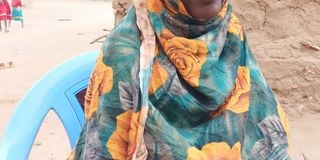Tana River girls paying the price for period poverty

Mariam Badesa (not her real name) was married to Hassan Bule, a 54-year-old man, as a second wife at the age of 14. It has been a traumatising marriage.
What you need to know:
- At the sight of their first menses, worry kicks in, coupled with trauma. With lack of sanitary towels, how they would get through the menstrual cycle is the million-dollar question that torments them.
- Period poverty has been blamed for the rising cases of teen pregnancy, early marriage and HIV infection.
Puberty is turning out to be the scariest stage for girls in Tana River County.
They are not ready for the experience that comes with it. And with high poverty levels ravaging the county, the girls brace themselves for the harsh reality of paying the price or bearing the shame.
At the sight of their first menses, worry kicks in, coupled with trauma. With lack of sanitary towels, how they would get through the menstrual cycle is the million-dollar question that torments them.
This stage in life is marred by tales of early marriage, teen pregnancies and rising HIV infection.
Mwanaisha Kheir*, a mother of two, is determined to finish her primary school and further her education, but poverty is standing in her way.
"I got my first child with a man from this village; he is my cousin. I had confided to him my frustrations with getting sanitary towels; he promised to help," she recounts.
The help did not come for free as she hoped. She had to sell her dignity, a move that has messed up her life. Her mother was struggling with her siblings, hence did not pay much attention to her as she was perceived as an adult.
Agony
"When I first told my mother about my plight, she gave me her old 'lesos' and taught me how to fold them for use during my menses. She made it clear that there was no money to spend on sanitary towels.”
However, the cloths were inconveniencing. She had to miss at least five hours of lessons hiding behind the school latrine as she waited for them to dry up so that she could take them back. Losing the menstrual rags meant a fresh start in search of new ones, and that wasn’t easy.
It was a crisis other girls were also going through, and still do. Even though the government provided sanitary towels in schools, they were not enough, leaving most of them suffering in silence.
"We get three packets of sanitary towels, some of us experience a heavy flow for eight days and some even 12 days. It requires at least six pads a day; therefore, three packs were very far from relief.”
When the cousin realised she was pregnant, he did not want to hear anything from her. But her mother was not shocked and just told her to carry the burden and learn from its frustrations.
She had to stay a year out of school. Her classmates proceeded to secondary school as she struggled to raise her child. A year later, she got pregnant again, this time, the man responsible stood by her.
“He is the one who insisted on me going back to school and finishing my primary education. He has promised to support me through high school if I score good marks,” she says.
Aisha Maneno* underwent a similar ordeal. The mother of one was impregnated by her uncle, who later rejected her. The cases go unreported
"He is the brother of my late father. He said I lied against him and even brought some boys to claim they were dating me to appear like I did not know the father of the child, which is untrue," she recounts.
Her mother, however, has been supportive, raising the baby as she progresses with school. She will be sitting her KCPE exam this year and hopes to perform well, despite the trauma she has suffered.
Aisha’s mother says she twice attempted to kill the baby, hence cannot be entrusted with her care. "In one incident, I found her suffocating the baby. I came into the house just in time and a minute longer and the child would have died,” she says.
Intervention
The plight of schoolgirls in the face of period poverty stirs bitter emotions. According to Milcah Yuda, a gender rights activist, girls are traumatised and need counselling, lest they turn grow into bitter adults.
"I try talking to them, counselling them and what I hear from them is very sad. They need not just sanitary pads but robust counselling as well," she says.
Ms Yuda notes that without counselling, there shall rise a generation of women with mental illness, hence a failed society.
More than 300 child pregnancies are recorded in Tana River County yearly, according to a report by the Ministry of Health.
On sexual exploitation, County Police Commander Richard Ng’eno says defilement cases are acted upon and sex pests punished. He, however, notes that some parents cut deals with perpetrators, hence hide cases from the police and organise secret marriages.
In some cases, parents convince their children not to testify, disappear from home or change statement, he said, adding that some parents only report to the authorities when they fail to benefit, but by then it is already late. Mr Ng’eno says a case is only mature when there is a complainant.





